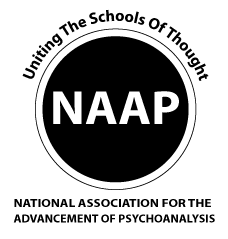The history of NAAP is a history of people, presidents, and members, and a striving for the recognition of psychoanalysis. In 1972, a group of psychoanalysts met to discuss how to enhance the development of psychoanalysis as an independent profession. This led to the formation of the National Association for the Advancement of Psychoanalysis (NAAP), incorporated that same year by Ethel Clevans, MS, Harold Davis, PhD, Leonard Liegner, MD, Phyllis Meadow, PhD, and Philip Polatin, MD.
In Los Angeles in 1973, ten institutes were represented at a meeting to plan the formation of the organization, including an annual conference. From the outset, conferences proved so important that at least one is held annually. Topics have ranged from “Psychoanalysis in an Age of Violence” to “Shame, Guilt & Prejudice: Emerging Possibilities.”
At the LA meeting, the following resolutions were adopted:
- The title “psychoanalyst” should be restricted to those professionals who have graduated from or have grandfather status in accredited psychoanalytic training institutes.
- Degree granting status is necessary for the survival of psychoanalytic training institutes, and NAAP will assist member institutes in establishing such status.
The trustees resolved that psychoanalysis and psychotherapy should be licensed, as there were already licenses in force that were misleading people as to who was qualified to practice. Existing law did not provide standards for the practice of psychotherapy and psychoanalysis, and as a result these professions could be practiced by anyone.
In 1994 psychoanalysts were certified by Vermont, and in 2000 by New Jersey. Then, in 2002, New York became the first state to recognize psychoanalysts with a “scope of practice” license that applies to all appropriately trained analysts from all the theoretical perspectives. Simultaneously, psychologists received a scope of practice license in psychology that included psychoanalysis in its scope, with exemptions for MDs, social workers, and registered nurses.
The founders envisioned NAAP as an organization of member institutes and individual members. However, they were advised that institute members and their accreditation functions would be subject to the decisions of NAAP’s board or they would need to become a separate organization. Therefore, on December 5, 1997, the Assembly of Psychoanalytic Institutes was formed, and they elected a board of trustees for the American Board for Accreditation in Psychoanalysis (ABAP). ABAP functions as a separate accreditation corporation, independent of NAAP, and a membership association in the field of psychoanalysis. The purposes of accreditation are to maintain and improve the quality of professional education and to safeguard the public.
In 1995 the Public Education Corporation of the National Association for the Advancement of Psychoanalysis was incorporated. Its purpose is to educate the public on the history, nature, and function of psychoanalysis and to clarify the role of psychoanalysis today.
Currently, NAAP has both a federal and a state lobbyist who are working to pass legislation (A#3910) that would allow the four professions––Creative Art Therapists, Mental Health Counselors, Marriage and Family Counselors, and Psychoanalysts––to form a single corporate structure. Additionally, A#2708 would mandate insurance reimbursement for the four professions in Article 163. We will continue to monitor current legislation and advocate for improvements, such as diagnose-and-treat or insurance reimbursement.
If you have not already done so, please consider joining us to promote and develop independent psychoanalysis. If you are a psychoanalytic candidate, help us ensure that independent psychoanalysis will continue to thrive in the future and let us help you.
Membership categories include Psychoanalyst, for graduates of a psychoanalytic institute, and Candidate, for those who are matriculated at a psychoanalytic institute.
If you are a researcher, educator, or mental health professional and have an interest in psychoanalysis, you can join us as an Affiliate member. We also invite all those who have an interest in psychoanalysis to support us as a Friend.
